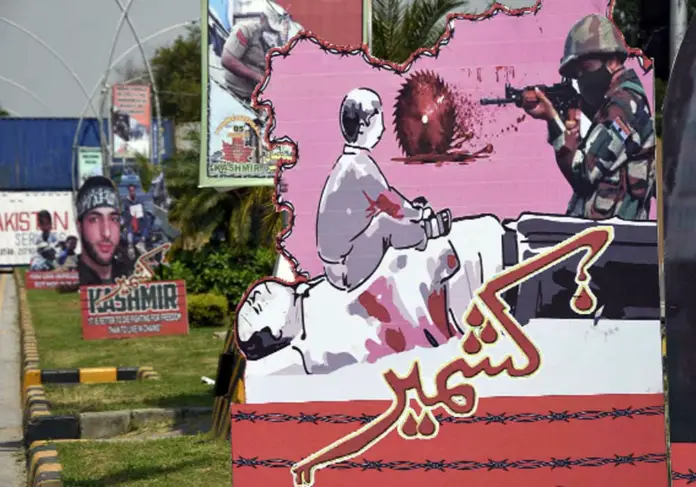The Kashmir conflict, rooted in the Subcontinent’s partition, persists as a long-standing political issue. Situated amidst the Himalayas, this region is of vital jurisdictional importance. Famous for its mesmerizing natural beauty, Kashmir has always been an enchanting and captivating destination with its intriguing history making headlines, now spanning over centuries. Dotted with periods of independence under regional dynasties, the valley has witnessed Mughal, Afghan and Sikh rules ultimately falling under Dogra control in 1846.
Marked by oppression, the Dogra era elicited a Muslim uprising in 1931, leading to calls for reforms and emergence of Sheikh Abdullah. The 1940s witnessed political factionalism, with the National Conference advocating for a secular independent state and the Quit Kashmir Movement challenging the monarchy. These historical developments set the stage for Kashmir’s complex socio-political journey. With the partition of the Subcontinent in 1947, Kashmir briefly enjoyed the taste of independence from August to October. Unfortunately, the first war between Pakistan and India in 1948 put a fatal dent into this newfound autonomy, resulting in the division of this princely state.
The picturesque Kashmir valley, coveted by both nations, became a contested terrain, suffering three wars over territorial supremacy. Despite these protracted conflicts, neither country successfully asserted control over the entire valley, culminating in its divisive partition. Presently, India administers the eastern side, while Pakistan oversees the western part of Kashmir. This historical narrative serves as a poignant reminder of the intricate geopolitical dynamics that profoundly influenced and continue to shape the Kashmir region’s identity, reflecting the enduring impact of historical events on its complex present.
In the critical Kashmir issue, the role of United Nations Security Council (UNSC) has remained under scrutiny. Rather than actively pursuing a resolution, the UNSC seemingly treated the Kashmir matter as a bilateral conflict between two states. Resolutions passed during this period primarily aimed at fostering peace between the two countries, emphasizing their responsibility towards a reasonable settlement. However, even in the presence of a resolution demanding plebiscite for resolving the Kashmir dispute, neither any concrete action taken nor any decision has been reached, during the last 75 years.
This prolonged state of uncertainty raises questions about the effectiveness of international interventions, underscoring the challenges in finding a formidable solution to this enduring conflict. The complex dynamics of Kashmir demand a re-evaluation of international efforts to ensure a more proactive approach that respects the aspirations and rights of the people involved and establishes peace over this region.
Unfortunately, throughout this period, the Kashmiri people have witnessed egregious human rights violations and abuses, enduring mass crackdown on their homes and businesses orchestrated by Indian forces. The alarming catalogue of injustices includes illegal detentions, kidnappings, and disturbing incidents of rape of Kashmiri women, exacerbating the already harrowing plight faced by the local population wherein their loved ones become victims of the Indian army’s heavy handedness.
Pakistan has consistently brought these grave concerns to the attention of the United Nations to assume a pivotal role in resolving this enduring crisis. Pakistan asserts that the Indian state-sponsored terrorism has resulted in the loss of over a hundred thousand lives of the Kashmiri people. The distressing human rights situation in Kashmir underscores the pressing need for international intervention and concerted efforts to bring about a just and lasting resolution, prioritizing alleviation of the affected people’s sufferings, ensuring that their fundamental rights are well protected.
The Human Rights Watch in their World Report, 2023 highlighted that since the revocation of Jammu and Kashmir’s autonomous status, violence has persisted with 229 reported deaths as of October, including 28 civilians, 29 security force personnel, and 172 suspected militants. Concerns arose as local Kashmiris contested the designation of some killed in gunfights as militants, asserting they were civilians. The report also highlights that media freedom faced challenges as journalists aligned with the government forcibly took over the Kashmir Press Club in January, with subsequent arrests of local journalists under charges such as criminal conspiracy and sedition raising questions about press freedom and arbitrary detention in the region. Since August 2019, 35 journalists in Kashmir have encountered various forms of harassment, ranging from police interrogation and raids to threats and physical assault.
The report further reveals that allegations of torture and extrajudicial killings persisted, with 147 deaths in police custody, 1,882 deaths in judicial custody, and 119 alleged extrajudicial killings reported in the first nine months of 2022, as registered by the National Human Rights Commission. Despite reduction of districts under the Armed Forces (Special Powers) Act (AFSPA) in some northeast states in March, it remained in effect in Jammu and Kashmir and 43 districts in four northeastern states, granting security forces effective immunity from prosecution for serious human rights violations.
The statistics highlighted in various reports are deeply disconcerting, especially in the aftermath of the annulment of Article 35A and 370 of the Indian Constitution, having negative effect for the special status of Kashmir. This move starkly violates United Nations resolutions with respect to Kashmir issue. As of today there is an alarming surge in human rights violations, a fact underscored by the Human Rights Watch’s report, providing evidence of severe transgressions in the valley.
Despite the gravity of these violations, both the United Nations and prominent human rights champions have maintained a perplexing silence, leaving a void in advocacy for the safety and well-being of innocent Kashmiris. There is a glaring absence of resounding voices pushing for a steadfast resolution of the Kashmir issue in alignment with the UN-mandated plebiscite. This leaves the people of Kashmir in a precarious situation, yearning for a voice determining the future of their beautiful state calling out to the world for immediate and concerted efforts to achieve a just and peaceful resolution in the region.
Pakistan consistently echoes Kashmiris’ voice and expresses solidarity with them on the 5th of February each year since 1990. This commemoration goes beyond a symbolic gesture; it signifies a renewed commitment to supporting Kashmiris’ right to self-determination. Importantly, it serves as a gentle yet firm reminder to the United Nations and the broader global community to actively contribute to resolving this issue in alignment with U.N. resolutions.
The annual observance of this day highlights the persistent struggles and aspirations of the Kashmiri people, urging the international community to pay heed to their plight. As we commemorate this day, it is necessary to emphasize the immediate need for global engagement. Protracting the resolution of the Kashmir issue not only jeopardizes regional stability but also poses a substantial threat to global peace. A resolute appeal is made to the global community to help in facilitating a peaceful resolution, ensuring the security and prosperity of the people of Kashmir, and thus contributing to global harmony.
______________________________________________________
Dr. Ikramul Haq, Advocate Supreme Court, specialises in constitutional, corporate, media and cyber laws, ML/CFT, IT, intellectual property, arbitration and international taxation. He holds LLD in tax laws with specialization in transfer pricing. He was full-time journalist from 1979 to 1984 with Viewpoint and Dawn. He served Civil Services of Pakistan from 1984 to 1996. He established Huzaima & Ikram in 1996 and is presently its chief partner as well as partner in Huzaima Ikram & Ijaz.
He studied journalism, English literature and law. He is Chief Editor of Taxation. He is country editor and correspondent of International Bureau of Fiscal Documentation (IBFD) and member of International Fiscal Association (IFA). He is Visiting Faculty at Lahore University of Management Sciences (LUMS) and member Advisory Board and Visiting Senior Fellow of Pakistan Institute of Development Economics (PIDE).
He has coauthored with Huzaima Bukhari many books that include Tax Reforms in Pakistan: Historic & Critical Review, Towards Flat, Low-rate, Broad and Predictable Taxes (revised & Expanded Edition, Pakistan: Enigma of Taxation, Towards Flat, Low-rate, Broad and Predictable Taxes (revised/enlarged edition of December 2020), Law & Practice of Income Tax, Law , Practice of Sales Tax, Law and Practice of Corporate Law, Law & Practice of Federal Excise, Law & Practice of Sales Tax on Services, Federal Tax Laws of Pakistan, Provincial Tax Laws, Practical Handbook of Income Tax, Tax Laws of Pakistan, Principles of Income Tax with Glossary and Master Tax Guide, Income Tax Digest 1886-2011 (with judicial analysis).
He is author of Commentary on Avoidance of Double Taxation Agreements, Pakistan: From Hash to Heroin, its sequel Pakistan: Drug-trap to Debt-trap and Practical Handbook of Income Tax. Two books of poetry are Phull Kikkaran De (Punjabi 2023) and Nai Ufaq (Urdu 1979 with Siraj Munir and Shahid Jamal). He regularly writes columns for many Pakistani newspapers and international journals and has contributed over 2500 articles on a variety of issues of public interest, printed in various journals, magazines and newspapers at home and abroad.
Twitter: DrIkramulHaq
____________________________________________
Abdul Rauf Shakoori, Advocate High Court, is a subject-matter expert on AML-CFT, Compliance, Cyber Crime and Risk Management. He has been providing AML-CFT advisory and training services to financial institutions (banks, DNFBPs, Investment companies, Money Service Businesses, insurance companies and securities), government institutions including law enforcement agencies located in North America (USA & CANADA), Middle East and Pakistan. His areas of expertise include legal, strategic planning, cross border transactions including but not limited to joint ventures (JVs), mergers & acquisitions (M&A), takeovers, privatizations, overseas expansions, USA Patriot Act, Banking Secrecy Act, Office of Foreign Assets Control (OFAC).
Over his career he has demonstrated excellent leadership, communication, analytical, and problem-solving skills and have also developed and delivered training courses in the areas of AML/CFT, Compliance, Fraud & Financial Crime Risk Management, Bank Secrecy, Cyber Crimes & Internet Threats against Banks, E–Channels Fraud Prevention, Security and Investigation of Financial Crimes. The courses have been delivered as practical workshops with case study driven scenarios and exams to insure knowledge transfer.
His notable publications are: Rauf’s Compilation of Corporate Laws of Pakistan, Rauf’s Company Law and Practice of Pakistan and Rauf’s Research on Labour Laws and Income Tax and others.
His articles include: Revenue collection: Contemporary targets vs. orthodox approach, It is time to say goodbye to our past, US double standards, Was Due Process Flouted While Convicting Nawaz Sharif?, FATF and unjustly grey listed Pakistan, Corruption is no excuse for Incompetence, Next step for Pakistan, Pakistan’s compliance with FATF mandates, a work in progress, Pakistan’s strategy to address FATF Mandates was Inadequate, Pakistan’s Evolving FATF Compliance, Transparency Curtails Corruption, Pakistan’s Long Road towards FATF Compliance, Pakistan’s Archaic Approach to Addressing FATF Mandates, FATF: Challenges for June deadline, Pakistan: Combating the illicit flow of money, Regulating Crypto: An uphill task for Pakistan. Pakistan’s economy – Chicanery of numbers. Pakistan: Reclaiming its space on FATF whitelist. Sacred Games: Kulbhushan Jadhav Case. National FATF secretariat and Financial Monitoring Unit. The FATF challenge. Pakistan: Crucial FATF hearing. Pakistan: Dissecting FATF Failure, Environmental crimes: An emerging challenge, Countering corrupt practices .
Twitter: Abbul Rauf Shakoori
The recent publication, coauthored with Huzaima Bukhari, is
Pakistan Tackling FATF: Challenges & Solutions
available at: https:/
/www.amazon.com/dp/B08RXH8W46h
ttps://aacp.com.pk/







